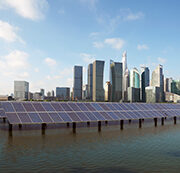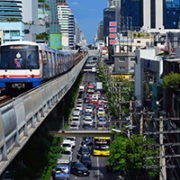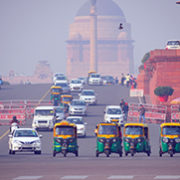Energy
 Health, Information and Communications Technology, Population
Health, Information and Communications Technology, Population
 Environment
Environment
 Economics, Finance sector development, Governance and public sector management, Industry and trade
Economics, Finance sector development, Governance and public sector management, Industry and trade
 Economics, Finance sector development, Governance and public sector management
Economics, Finance sector development, Governance and public sector management
 Environment, Finance sector development
Environment, Finance sector development
 Industry and trade, Infrastructure, Regional cooperation and integration
Industry and trade, Infrastructure, Regional cooperation and integration
 Economics, Finance sector development
Economics, Finance sector development
 Health
Health
 Environment, Industry and trade
Environment, Industry and trade

Energy Efficiency: The Cornerstone for Achieving SDG 7

In 2015, all countries of the world agreed to adopt the 17 Sustainable Development Goals (SDGs) as a part of the 2030 Agenda for Sustainable Development. These goals came into force on 1 January 2016 and are aimed at ending poverty, protecting the planet, and attaining prosperity for all. The adoption of the goals was a unique achievement as they are applicable universally, and countries are making joint efforts to achieve them. Although the SDGs are not legally binding, countries are expected to take ownership and to voluntarily report their progress at the national level.
Piecemeal Policy Approaches to Aging Societies: Can They Be Avoided with Proper Data on Well-Being?

The rapid pace of aging in developed and developing countries, especially in Asia, requires data for informed decision-making to ensure the well-being of aging populations. But for many countries, data for sound policy-making, planning, and investment targeting have not been available. This has led to piecemeal public policies with little sense of priority.
Minimizing the Cost of Fecal Sludge Management through Co-Treatment

The City Development Initiative for Asia, the Asian Development Bank, other multilateral agencies, and national governments are funding sewerage systems for medium and large cities throughout Asia. Even at “full” sewerage coverage, cities often find that some, if not many, buildings are still reliant on septic tanks, pits, or other onsite systems. For cities with or that are planning sewerage systems, co-treatment may enable citywide sanitation by minimizing the need for standalone fecal sludge treatment plants.
FDI and Its Impacts on Entrepreneurship and Informal Markets: A Double-Edged Sword?

Foreign direct investment (FDI) is attractive, especially for developing and emerging markets, as it brings new technologies and mitigates the constraints imposed by low domestic capital formation. Lawmakers enact various policies to make such investments attractive for foreigners, and businesses often actively seek foreign collaborators. India, for instance, under the present government, has been aggressive in seeking foreign investments through its “Make in India” campaign.
Will Financial Liberalization Trigger the First Crisis in the People’s Republic of China?

The People’s Republic of China (PRC) has been liberalizing its financial system for nearly 4 decades. While it now has a comprehensive financial system with a large number of financial institutions and large financial assets, its financial policies are still highly repressive. These repressive financial policies are now a major hindrance to the PRC’s economic growth (Huang and Wang 2011).
Green bonds experience in the Nordic countries

According to the Asian Development Bank, developing countries in Asia will need to invest an estimated $26 trillion through 2030, or $1.7 trillion per year, in infrastructure to maintain growth, eliminate poverty, and address climate change. Given their limited public resources, developing countries in Asia will need to find ways to mobilize and leverage significant amounts of private capital to meet the investment requirements for the Paris Agreement and the Sustainable Development Goals.
One Belt One Road and the Risks Behind the Win-Win Situation

The New Silk Road Initiative was originally unveiled by Chinese President Xi Jinping in 2013 and became known as the Belt and Road Initiative (BRI). From the beginning, the initiative was presented as a reestablishment of the trade routes that were successful many centuries ago. The initiative was also a call for partner countries to accelerate transport infrastructure improvements and connectivity to boost trade. Through active diplomacy and intense public relations, 65 countries felt they had to join the initiative with the prospect of Chinese financial assistance.
Managing financial globalization: A guide for developing countries

As cross-border capital flows rise relative to world gross domestic product (GDP), developing countries do not wish to miss the associated benefits. But at the same time, they are also anxious about avoiding the associated economic instability and distortions. What is the right strategy with regards to international capital flows? We can draw lessons based on the recent literature.
The Economic Burden of Overweight and Obesity Reaches 3% of GDP in Indonesia

Overweight and obesity are on the rise in Indonesia. The results of the Basic Health Survey, a national, community-based survey that measures body mass index (BMI), for 2007, 2010, and 2013 show the rising prevalence of overweight and obesity in Indonesia. Several combining factors increase overweight and obesity. These include the consumption of energy-dense food, the intensive advertisement of unhealthy food, and the consumption of unhealthy school meals.
Globalization and the environment in India

India embarked on a path of liberal economic reform in the 1990s after years of nurturing an intensively regulated and controlled economic environment that was loosened slightly in the mid-1980s. The most important and critical segments of this reform were trade and foreign investment. India has felt the impact of globalization through increased prosperity, partly triggered by increasing trade volumes, investment, and growth.


Search
Subscribe / Connect to Asia Pathways
Subjects
- Accelerating Progress in Gender Equality
- Addressing Remaining Poverty and Reducing Inequality
- Agriculture and natural resources
- Capacity development
- Climate change
- Economics
- Education
- Energy
- Environment
- Finance and Innovation
- Finance sector development
- Gender
- Globalization and Economic Stability
- Governance and public sector management
- Health
- Human Capital Development for Inclusive Growth and Shared Prosperity
- Industry and trade
- Information and Communications Technology
- Infrastructure
- Making Cities More Livable
- Miscellaneous
- Population
- Poverty
- Private sector development
- Regional cooperation and integration
- Sanitation
- Social development and protection
- Strengthening Governance and Institutional Capacity
- Subjects
- Transport
- Uncategorized
- Urban development
- Video Blog
- Water
Recent Posts
- The Promise and Perils of Mother Tongue-Based Education
- From Crisis to Resilience: The Evolution of the Banking Sector in Asia and the Pacific
- Tariffs on the Table: What Could Be Asia’s Next Move?
- Investing in Childcare a Win for Women and the Economy
- Flush and Flourish: Upgraded Toilets Can Transform Lives in Rural Asia




Recent Comments